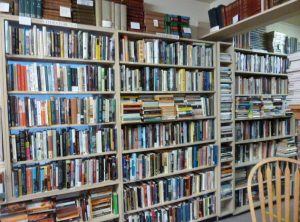 Reading
Reading
The books that have resonated with me this past two weeks are books about reading. In one an important “personage” discovers reading later in life. Of course, she has always read — letters, recipes, documents, assignments– but at this stage of her life she discovers books as a window to the world. She reads indiscriminately, taking whatever volume the librarian hands her. She has not planned what type of book is worth her time. History, fantasy, travel, romance, classics, foreign language — all are equally welcome on her bedside table.
The more the “personage” reads, the more she explores her own feelings. Because, that is what books do. They invite the reader into the world of another person. They help the reader to experience the events and feelings, of that person’s life. Our “personage” finds her values, inherited and always unquestioned, begin to soften as she gets inside the mind and heart of the characters in her books.
In the beginning, reading was a guilty pleasure for our heroine. As time goes on, and more books are studied, she looks on the people she meets in the real world with more understanding. She hears their comments from a place of vulnerability. Through the reading of books, our lady of position becomes more human.
The second book, I referenced in my last blog. In this case, the heroine of the story works with words and books all the time, but is forbidden to read them. Over and over she is told her job is “to fold the pages, not read them.” But she has a longing within her to know what the words mean, to know what knowledge they impart, to read the complete thoughts of another. She knows that she is missing something. Every time she folds a book, gathers the sections and sews it together, she wants more. She wants to know what the author said, what aspect of humanity is laid down on the written page.
Without giving away too much of the plot, I will say that, by the end of the book, she is allowed to read the books, not just bind them.
Unlike the protagonist in the first book, who discovered humanity through reading, the second heroine discovers herself through reading.
AI
In between reading these lovely books, I read several articles about the rise of AI (Artificial Intelligence)in the world and what that means for writers and artists and other “creatives.” The forecast is not hopeful. The potential for AI to replace real people in the arts is enormous — and disheartening.
AI is not human. AI can sort and regurgitate inputs at a tremendous rate of speed. A reader can order up a book in the style of Nora Roberts, set in Australia, and featuring a blind protagonist and get a readable result in minutes. What they don’t get is Nora Roberts’ understanding of the human condition. They don’t get insight — they get a distillation. They don’t get real, human emotion, they get a simulation of emotion. Remember when intellectuals scoffed at the “Reader’s Digest” version of books? They held that these condensed books missed out on the value of the writing and merely presented a summary of the story. Well if a condensed book was unworthy, AI is even worse.
Give me books that plumb the heights and depths of the human experience. Give me books that enlighten. Give me books that create empathy. Give me books of original characters that will live in my mind for days or even years to come. Only a skillful, human writer can produce Tom Sawyer, or Elizabeth Bennet, or Cinderella. Characters that have become part of our collective conscience.
AI can mimic them.
It cannot create them.
I hope that we readers, are like the characters in the two books I described–folks who explore the human condition through the imaginings of a human author. The world of the individual will improve and the world of our collective society will benefit.
Please drop a comment here.


Leave a Reply